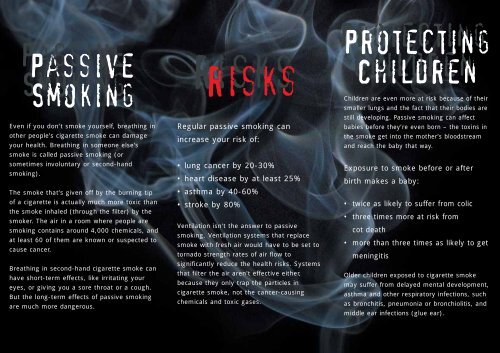Passive Smoking - Health Promotion Agency
Passive Smoking - Health Promotion Agency
Passive Smoking - Health Promotion Agency
Create successful ePaper yourself
Turn your PDF publications into a flip-book with our unique Google optimized e-Paper software.
Even if you don’t smoke yourself, breathing in<br />
other people’s cigarette smoke can damage<br />
your health. Breathing in someone else’s<br />
smoke is called passive smoking (or<br />
sometimes involuntary or second-hand<br />
smoking).<br />
The smoke that’s given off by the burning tip<br />
of a cigarette is actually much more toxic than<br />
the smoke inhaled (through the filter) by the<br />
smoker. The air in a room where people are<br />
smoking contains around 4,000 chemicals, and<br />
at least 60 of them are known or suspected to<br />
cause cancer.<br />
Breathing in second-hand cigarette smoke can<br />
have short-term effects, like irritating your<br />
eyes, or giving you a sore throat or a cough.<br />
But the long-term effects of passive smoking<br />
are much more dangerous.<br />
Regular passive smoking can<br />
increase your risk of:<br />
• lung cancer by 20-30%<br />
• heart disease by at least 25%<br />
• asthma by 40-60%<br />
• stroke by 80%<br />
Ventilation isn't the answer to passive<br />
smoking. Ventilation systems that replace<br />
smoke with fresh air would have to be set to<br />
tornado strength rates of air flow to<br />
significantly reduce the health risks. Systems<br />
that filter the air aren't effective either,<br />
because they only trap the particles in<br />
cigarette smoke, not the cancer-causing<br />
chemicals and toxic gases.<br />
Children are even more at risk because of their<br />
smaller lungs and the fact that their bodies are<br />
still developing. <strong>Passive</strong> smoking can affect<br />
babies before they’re even born – the toxins in<br />
the smoke get into the mother’s bloodstream<br />
and reach the baby that way.<br />
Exposure to smoke before or after<br />
birth makes a baby:<br />
• twice as likely to suffer from colic<br />
• three times more at risk from<br />
cot death<br />
• more than three times as likely to get<br />
meningitis<br />
Older children exposed to cigarette smoke<br />
may suffer from delayed mental development,<br />
asthma and other respiratory infections, such<br />
as bronchitis, pneumonia or bronchiolitis, and<br />
middle ear infections (glue ear).

















